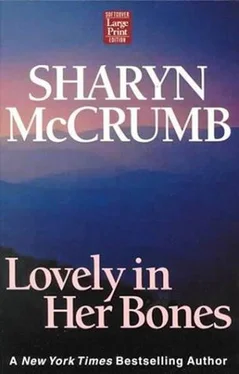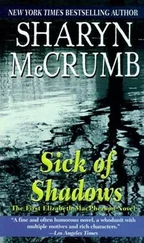“This is our turnoff,” nodded Milo. “Be on the lookout for a white frame church.”
“I want to go and see her. She’s supposed to be over eighty, and she knows everything about root medicine. I brought my notebook. Do you suppose she’ll take me out gathering with her?”
“Maybe. But first you’ve got to get moved into the Sunday school room, do your K.P. assignment, and go to the diggers’ meeting that Alex is having after supper. Remember, I’ve vouched for you on this dig. Don’t let me down.”
Elizabeth was surprised at Milo’s serious tone. She had never heard him so businesslike. “I’ll do my job,” she said meekly.
Milo didn’t answer. He seemed intent on the winding road in front of them. It lurched through oak groves and banks of mountain laurel, which parted now and then to provide a glimpse of the creek below. The only sign of human habitation was an occasional mailbox nailed to an upturned log and surounded by clumps of Queen Anne’s lace and tiger lilies. Milo, oblivious to the beauty of the summer woods, wondered why he was so edgy. This was a routine excavation, after all; surely there was less at stake here than there was when he assisted the medical examiner in criminal cases. Why should he be more nervous now? He told himself that it would turn out to be two weeks on a hot, dull job. The glamour of grave robbing was vastly overrated. With an effort of will, he made himself concentrate on the routine tasks ahead.
After a few more miles of gradually broadening bottomland, the road opened up into fenced pastures, and finally to a cluster of houses comprising the community of Sarvice Valley. The church was easy to spot: it sat on a wooded hillside overlooking the village and was actually several miles farther off than it appeared.
Elizabeth looked at the weathered frame houses, whose sagging porches and battered roofs testified to their age. “It doesn’t look like an Indian village,” she said doubtfully.
“Very true. I think the Cherokees mostly have brick homes with carports.”
Elizabeth made a face at him. “You know what I meant!”
“Something out of a John Wayne movie, I expect. The interesting thing is that with the Cullowhees, this isn’t just the effects of civilization on their culture. Apparently, they’ve always lived and talked like everybody else. It would make an interesting study.”
He drove onto a dirt side road, across a narrow wooden bridge, and steeply uphill toward the white church, which flashed in and out of their line of sight as they curved through the woods. On one side of the hill a small meadow had been cleared on the creek side of the church, for picnics and baptisms. Two cars and a van had been parked in the meadow just off the road. Milo pulled in beside the van.
“Everybody’s here already, I guess. Let’s get our stuff unloaded and take it up to the church.”
“I thought we were excavating a cemetery. I don’t see one.”
“It’s behind the church, but that’s not the one we’ll be working in. Those graves with the granite headstones are pretty recent-1930 and on. The old burying ground is farther up the hill, past a little stretch of woods.”
“Have you seen it?”
“No. Dr. Lerche came up here earlier this week with Mr. Stecoah, and he did some preliminary work. He’ll cover that in his lecture after dinner. Do you need any help carrying anything? No?” He slammed the trunk. “Let’s go.”
The Sunday school room had a plank floor, walls of unfinished boards, and a smeary copy of the Last Supper done on black velvet. The wooden folding chairs had been stacked by the table at one corner of the room, beside boxes of food and supplies. Five sleeping bags were laid out in the center of the room, and on one of them sat Mary Clare Gitlin playing a guitar. She had not heard them come in. Her blond hair brushed the neck of the instrument as she chorded the notes to a mountain song: “Love, oh love, oh careless love. Look what love has done to me.”
“Hello, there!” said Milo, more loudly than necessary.
“Hello yourself, stranger,” called out Mary Clare. “What took you so long?”
“Well, that road was no picnic. I never tried to drive over a washboard before. And then I had a passenger who wanted to stop at every tourist trap on the highway.” He nodded toward Elizabeth. “Mary Clare, this is Elizabeth MacPherson. She’s… uh… a friend of mine.”
Mary Clare extended her hand to Elizabeth. “Pleased to meetcha. I haven’t heard a thing about you,” she said with a smile that made the statement patently untrue.
“So, who’s here?” asked Milo, looking around.
“Alex, of course. He’s up at the site poking around. And two guys from my intro class volunteered to come for the experience. I don’t know if you’ve run into them or not. Victor Bassington and Jake Adair.”
Milo made a face. “Bassington. Yeah. He hangs around the department all the time. Know-it-all. But you mean that’s it? Six of us?”
“Six of us staying here. We got four more people coming in for daytime, but they’ll be going home at night. Alex got them from the state archaeological society.”
“Amateurs?”
“Seems like it. College undergrads, at best.”
“What about consultants?”
“None at the moment. The Carolina guy is off at a conference, and the folks at U.T. have a big project of their own going. Maybe one of them will check our stuff later on. Nobody’s an expert on Cullowhees, anyhow. They’re such a small group, and so lacking in distinctive cultural features, that nobody ever got around to doin’ ’em.”
Milo smiled. Mary Clare’s accent was still a mixture of East Tennessee dialect and sociologist’s jargon. Four years of college hadn’t made much of a dent in it, he was glad to see. As an anthropologist he was all for people maintaining their cultural heritage. Too bad the Cullowhees had lost theirs; things would have been much easier if there had been a few clues to go on. Maybe something would turn up at the gravesite.
“Well, anyway, I’m glad you’re here. Milo, why don’t you hunt up Jake and Victor and get the van unloaded while Elizabeth helps me set up Alex’s slide projector?”
Milo looked stricken. “What about supper?”
Mary Clare smiled mischievously. “Why, Milo, it’s real sweet of you to offer, but it isn’t necessary. Mr. Stecoah has arranged a covered-dish supper here at the church so that the Cullowhees can meet us. They’re even going to sit in on Alex’s introductory lecture.”
“Won’t that be dull for them?”
“I don’t know. Alex seems pretty excited.” Her eyes shone. “I think it’s going to do him a world of good to be away from that old college.”
Milo looked uneasy. “Yeah… well… I guess I’d better start unloading the van. See you later, Elizabeth.”
“I guess he’s rather tired,” said Elizabeth quickly. “It was a long drive up here. Why don’t you show me what you want me to do?”
Two hours later, the Sunday school room had been transformed into a dining hall by the addition of two dozen folding chairs and three card tables covered with sheets. The residents of Sarvice Valley had arrived in small groups, carrying bowls of beans and potato salad, meatloaf, pans of cornbread, and homemade cakes. They had eyed the diggers shyly at first, talking among themselves, but finally one stout woman had marched up to Elizabeth and Mary Clare and asked: “Which one of you’uns is married to that professor?”
“Neither one of us,” said Mary Clare just as bluntly. “We’re hired on. His wife stayed home in a big old brick house.”
The woman nodded, satisfied. The answer seemed to fit her idea of the way the world should be run. “You ain’t married atall?” she asked. Why, they must be twenty-one if they was a day, she reckoned.
Читать дальше












